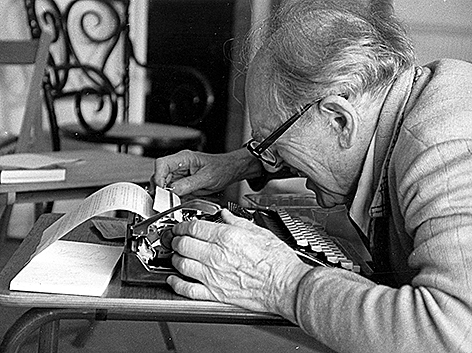Leopold Kohr and modesty ...
In medieval philosophy, temperament referred to the combination of qualities in a certain proportion, determining the characteristic nature of something. So in physiology one sought to balance the four cardinal humors of the body—the sanguine, choleric, phlegmatic, and melancholic temperaments—in order to achieve the proper relative proportions. Temperament always implied a due or proportionate mixture, a proper or fitting combination. “To temper” was to bring something to its proper or suitable condition, to modify or moderate something favorably, to achieve a just measure.At the beginning of the eighteenth century, “to temper” came to mean to tune a note or instrument in music to some temperament—that is, to adjust the intervals of the scale in instruments of fixed intonation such as the piano. This was a radical departure from the earlier meaning and signaled the effective disappearance of the ancient notion of proportion in music as in other areas of modern life.In ethics, values are as opposed to an immanent, concrete proportion as are the sounds of Helmholtz. Like them, values run counter to tonos, the specific tension of a mutuality or reciprocity. As timbre separated from tone, so that one could play a violin’s part on the piano, so an ethics of value—with its misplaced concreteness—allowed one to speak of human problems. If people had problems, it no longer made sense to speak of human choice. People could demand solutions. To find them, values could be shifted and prioritized, manipulated and maximized. Not only the language but the very modes of thinking found in mathematics could norm the realm of human relationships. Algorithms “purified” value by filtering out appropriateness, thereby taking the good out of ethics.
So charming as individuals or small aggregations ...
When one attempts to utilize or exploit the good, natural inclination is extinguished. Such a propensity, the desire of everything for its own good, was accepted as inherent to all existence and was termed natural love. Even for several generations after Newton, rain was not drawn downward but sought its natural place. Flowers reached up toward the sun. Among people, this attraction was understood as a step toward friendship and friendship as the fruit of civil life. All were called to the other, to friendship.Kohr lived in the fidelity of friendship, and he served this vision by awakening wisdom, sapientia—a word derived from tasting food. He knew that not any inclination but a certain awareness and feeling, a certain sensitivity to the appropriate, is the necessary condition of friendship. He knew that the historical loss of this knowledge fosters the emergence of social mutations that can be recognized now as monsters. Get Greek melodies from a piano? As well get beauty from economics!
Thanks to Kurt for pointing the way.












































































































































































No comments:
Post a Comment